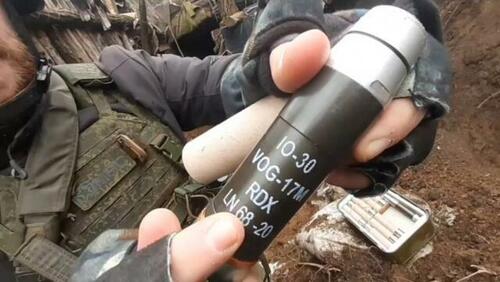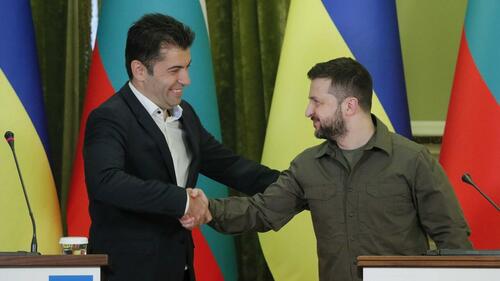
Bulgaria says it's "done enough" for Ukraine and has no plans to send heavy weapons, a Tuesday statement from Bulgarian Prime Minister Kiril Petkov indicated.
"We’ll do what we have promised to do and there’s no need to reignite the debate every two weeks," Petkov said. "We’ve supported the incoming refugees, we have sent all kinds of humanitarian aid, we have also been involved with repairing Ukraine’s heavy weapons and we’re in line with all sanctions against Russia."

The pushback from Bulgaria's leader comes amid growing pressure after most NATO countries have ramped up their military supplies to Kiev, including some Baltic and Western European states transferring heavy weapons, up to an including even tanks.
Since the war's start and Western calls for heavier armaments to help Ukrainian forces repel the Russian invasion, the question of aid to Ukraine has threatened to fracture Petkov's ruling coalition government, resulting in an earlier agreement that Sofia would refrain from supplying arms or ammunition.
Previously European media reported:
The Bulgarian Socialist Party, or BSP, is traditionally friendly towards Russia and since Russia invaded Ukraine on February 24 this year, it threatened to leave the country's coalition government if Sofia were to send weapons to Ukraine. The party's departure would topple the current Bulgarian government.
BSP supporters and allies have argued that supplying arms would make Bulgaria a party to the conflict, resulting in Russian retaliation, which has been the position of Bulgarian President Rumen Radev.
A week ago a report in The Wall Street Journal detailed growing dissent against the US-UK plan for bigger arms for Ukraine: "Cracks are appearing in the Western front against Moscow, with America’s European allies increasingly split over whether to keep shipping more powerful weapons to Ukraine, which some of them fear could prolong the conflict and increase its economic fallout," the report said.

It continued: "At the center of the disagreement—which is splitting a group of Western European powers from the U.S., U.K. and a group of mostly central and northern European nations—are diverging perceptions of the long-term threat posed by Russia and whether Ukraine can actually prevail on the battlefield."
The UK's Boris Johnson in particular has been at the forefront of telling the Ukrainians to not concede any territory or negotiation with the Russians, despite that this uncompromising approach is sure to end in more death and destruction. Geographically and geopolitically, eastern European states like Bulgaria have much more to lose if the chart an uncompromising approach to "standing up" to Moscow.
Bulgaria says it’s “done enough” for Ukraine and has no plans to send heavy weapons, a Tuesday statement from Bulgarian Prime Minister Kiril Petkov indicated.
“We’ll do what we have promised to do and there’s no need to reignite the debate every two weeks,” Petkov said. “We’ve supported the incoming refugees, we have sent all kinds of humanitarian aid, we have also been involved with repairing Ukraine’s heavy weapons and we’re in line with all sanctions against Russia.”

The pushback from Bulgaria’s leader comes amid growing pressure after most NATO countries have ramped up their military supplies to Kiev, including some Baltic and Western European states transferring heavy weapons, up to an including even tanks.
Since the war’s start and Western calls for heavier armaments to help Ukrainian forces repel the Russian invasion, the question of aid to Ukraine has threatened to fracture Petkov’s ruling coalition government, resulting in an earlier agreement that Sofia would refrain from supplying arms or ammunition.
Previously European media reported:
The Bulgarian Socialist Party, or BSP, is traditionally friendly towards Russia and since Russia invaded Ukraine on February 24 this year, it threatened to leave the country’s coalition government if Sofia were to send weapons to Ukraine. The party’s departure would topple the current Bulgarian government.
BSP supporters and allies have argued that supplying arms would make Bulgaria a party to the conflict, resulting in Russian retaliation, which has been the position of Bulgarian President Rumen Radev.
A week ago a report in The Wall Street Journal detailed growing dissent against the US-UK plan for bigger arms for Ukraine: “Cracks are appearing in the Western front against Moscow, with America’s European allies increasingly split over whether to keep shipping more powerful weapons to Ukraine, which some of them fear could prolong the conflict and increase its economic fallout,” the report said.

It continued: “At the center of the disagreement—which is splitting a group of Western European powers from the U.S., U.K. and a group of mostly central and northern European nations—are diverging perceptions of the long-term threat posed by Russia and whether Ukraine can actually prevail on the battlefield.”
The UK’s Boris Johnson in particular has been at the forefront of telling the Ukrainians to not concede any territory or negotiation with the Russians, despite that this uncompromising approach is sure to end in more death and destruction. Geographically and geopolitically, eastern European states like Bulgaria have much more to lose if the chart an uncompromising approach to “standing up” to Moscow.







